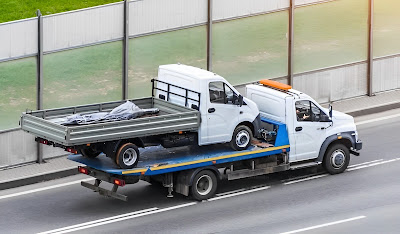What Are the Legal Considerations of Long-distance Towing?
Long-distance towing involves transporting vehicles over substantial distances, often across state or even national borders. Whether you’re a professional tow truck operator, a vehicle owner, or simply someone interested in the subject, it’s essential to understand the legal considerations associated with long-distance towing.
The key legal aspects and regulations that govern long-distance towing:
1. Licensing and Permits
One of the primary legal considerations in long-distance towing is licensing and permitting. Different countries, states, and even municipalities have their own licensing requirements for tow truck operators. To perform long-distance towing legally, you must hold the necessary licenses and permits. In the United States, for instance, you may need a Commercial Driver’s License (CDL) with specific endorsements, such as T or H endorsements, which are often required for towing vehicles that exceed a certain weight or size.
Furthermore, some states may have additional requirements for towing companies, like specific permits for interstate or long-distance towing operations. Researching and complying with the licensing and permitting regulations in your jurisdiction is essential to avoid potential legal issues.

2. Vehicle Compliance and Safety Standards
Long-distance towing vehicles must adhere to strict compliance and safety standards to make sure the safety of both the tow truck operator and the public. This includes adhering to regulations related to the design, construction, and maintenance of tow trucks. Ensuring that the tow vehicle works properly and meets weight and size limitations is crucial.
In the United States, for instance, tow trucks are subject to various regulations set by the Federal Motor Carrier Safety Administration (FMCSA). These regulations cover everything from vehicle inspections to the securing of loads and the qualification of drivers. Compliance with these standards is particularly important for long-distance towing, as it often involves transporting heavy and oversized vehicles.
3. Insurance Requirements
Insurance is a critical legal consideration in long-distance towing. Towing companies and operators need the appropriate insurance coverage to protect themselves, their clients, and the vehicles they tow. Liability insurance is typically required to cover potential damages or injuries that may occur during the towing process. Additionally, cargo insurance may be compulsory to cover any damage to the vehicles being transported.
The specific insurance requirements can differ depending on your location and the type of towing you engage in. Failing to carry suitable insurance can result in severe legal consequences, including fines, license revocation, and even lawsuits in the event of accidents or damage.
4. Contractual Agreements
Long-distance towing often involves complex contractual agreements, especially when towing vehicles across state or national borders. These agreements should be legally sound and clearly outline the terms and conditions of the towing service. Including details regarding pricing, delivery schedules, liability, and any additional services is essential.
A written agreement that both parties approve is crucial to prevent potential legal disputes. If you’re hiring a long-distance towing service, make sure to evaluate the contract carefully and ensure that it covers all your needs and concerns. When providing towing services, it’s vital to have legal counsel review and draft your contracts to protect your interests and ensure that you’re complying with applicable laws.
5. Road Regulations and Traffic Laws
Long-distance towing often involves driving through various states or even countries, each with its own set of road regulations and traffic laws. Towing operators must be well-versed in the traffic laws of the areas they’ll be traversing. This includes speed limits, overtaking rules, and requirements related to signaling, weight limits, and vehicle dimensions.
Ignoring these regulations can lead to traffic violations, fines, and even towed vehicle impoundments. It can also create safety hazards for the towing operator and other road users. Staying informed and adhering to the traffic laws of the regions you’ll travel through is essential for a legal and safe long-distance towing operation.
6. Border Crossing and International Towing
If your long-distance towing operation involves crossing international borders, a whole new set of legal considerations comes into play. Towing vehicles across borders requires compliance with customs, immigration, and import/export regulations. Each country will be required to declare the vehicles, pay duties or taxes, and provide the necessary documentation.
You may need to work with customs brokers and ensure that the appropriate paperwork, such as certificates of title, bills of lading, and import permits accompany the vehicles you’re towing. Failure to comply with international regulations can lead to significant legal complications, including delays at border crossings and the impoundment of vehicles.
7. Driver Hours of Service
Long-distance towing operators are subject to “hours of service” regulations, which dictate the maximum amount of time a driver can spend on the road without taking mandatory rest breaks. These regulations are designed to avoid driver fatigue and promote road safety.
Compliance with these regulations is crucial, as violating them can result in fines and legal consequences. Long-distance tow truck operators must keep detailed records of their driving hours and rest periods to ensure they are within the legal limits.
8. Duty of Care
Towing companies and operators are legally obligated to exercise a duty of care when transporting vehicles, especially for long distances. This means taking all reasonable steps to ensure the safety and security of the towed cars. Failing to secure a vehicle or take precautions during transport properly can result in accidents, damage to the towed vehicle, and legal liability.
To fasten vehicles securely, towing operators must use appropriate towing equipment, such as straps, chains, and wheel lifts. Regular inspections and maintenance of towing equipment are necessary to ensure everything is in good working order.
Conclusion
Long-distance towing is subject to many legal considerations that can differ depending on the location and the towing operation’s specifics. To operate within the bounds of the law and avoid potential legal issues, it’s essential for towing companies and operators to be well-informed about and compliant with all relevant regulations. Towing businesses can provide a valuable service while minimizing legal risks and liabilities by ensuring legal compliance and putting safety first.
Source: https://medium.com/@tictoctow/what-are-the-legal-considerations-of-long-distance-towing-22b1b87193a3


Comments
Post a Comment